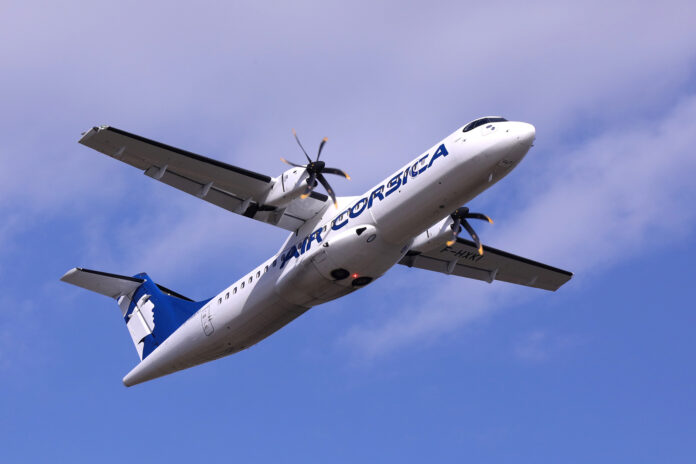ATR, the world number one regional aircraft manufacturer, and Air Corsica, Corsica’s leading air transport operator, have confirmed a firm order for two ATR 72-600 aircraft placed initially at the Paris Air Show. Air Corsica has completed the full transition of its fleet of ATR -500 series to the latest generation of turboprop aircraft, demonstrating its commitment to operational excellence, regional connectivity and sustainability.
The two aircraft are scheduled for delivery in the first half of 2024, at which time Air Corsica will have fully harmonised its regional fleet. The airline will have seven ATR 72-600 aircraft, powered by the latest PW127XT engines, optimising the reliability, comfort, operating costs and CO2 emissions of its connecting flights between Corsica’s four airports and Nice and Marseille and providing a high-quality public service.
“This order marks an important turning point for Air Corsica, which places a special focus on sustainable development, Corsican passenger satisfaction and connectivity – regional in particular. By harmonising our fleet around the ATR 72-600 aircraft, we will continue to contribute actively to our island’s economic prosperity, providing our customers with a fast, reliable, economical and socially responsible means of transport.”
Marie-Hélène Casanova-Servas, President of Air Corsica’s Supervisory Board
“We are proud to support Air Corsica with its fleet upgrade, and to set together new standards for regional aviation. Air Corsica was the launch customer of the PW127XT engine, and the first ATR operator in the world to integrate USB sockets in all its seats. Through this pioneering spirit that we share, we are sending out a strong message: regional aviation can and must be reliable, low emission, comfortable and connected.”
Nathalie Tarnaud Laude, Chief Executive Officer of ATR
Air Corsica was the first operator to take delivery of an ATR 72-600 equipped with the new PW127XT engine at the end of 2022, which brought a 20% reduction in maintenance costs and at least a 3% reduction in fuel consumption compared with the PW127M. It generates CO2 emission savings of 45% compared with a similar-size regional jet.













